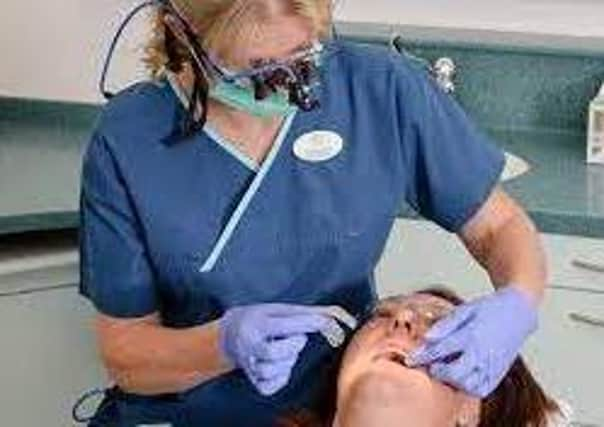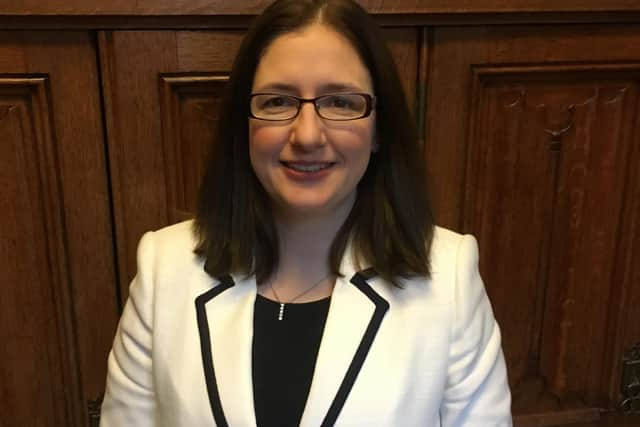Sleaford MP proposes dental training school in Lincolnshire


Dr Caroline Johnson led an adjournment debate on Wednesday evening in the House of Commons to consider the desperate state of NHS dentistry in Lincolnshire.
She explained: “Difficulties in accessing NHS dental services is common in my constituency and across our rural county.
Advertisement
Hide AdAdvertisement
Hide Ad“During my speech I raised constituents’ experiences of lengthy waiting times, problems accessing dental healthcare for service families, and how the backlog caused by the pandemic has put further strain on already stretched services.


“I also highlighted the way that current target-based dental contracts in the form of UDA’s (Units of Dental Activity) create further problems and disincentivise additional work.”
Maria Caulfield, the Parliamentary Under-Secretary for Health and Social Care, agreed that the NHS dental contract needs to be renewed to tackle these problems, and said that the Government is looking at what they can do to support provision in rural and coastal areas. The Minister has also agreed to meet with Dr Johnson to discuss the further impacts on military personnel in particular.
Dr Johnson commented: “I am pleased that the Minister has also agreed to look at my suggestion of the establishment of an East Midlands Dental School in Lincolnshire which would drastically improve access to routine and specialist care locally. Of course this would not have an immediate impact but I believe that in the longer term this would boost training and recruitment of dentists in Lincolnshire and the wider East Midlands region, while improving the education and skills offer in the county in conjunction with the new Lincoln Medical School.”
Advertisement
Hide AdAdvertisement
Hide AdDr Johnson said in her speech to the Commons: “Many constituents have contacted me to share their experiences: people waiting years to access NHS dental care; children unable to access NHS orthodontic care, with a choice between hugely expensive private treatment and doing without; service families posted to Lincolnshire struggling to get an appointment. Figures show that just 41 per cent of adults in Lincolnshire have accessed NHS dental care in the past two years, and less than a third of children have accessed it in the last year.
“Access to specialist treatment is even more limited. Lincolnshire has gone from having three full-time consultants in orthodontics, based in Boston, Grantham and Lincoln, to just one permanent consultant two days a week, based in Lincoln. Unlike neighbouring counties in the East Midlands, Lincolnshire has no specialist dental services either in paediatrics or in restorative dentistry, which means significant travel out of county for patients who require more specialist help.
“It is therefore perhaps not surprising that 80 per cent of Healthwatch complaints in Lincolnshire relate to problems with access to NHS dental services.”
John Hayes, MP for South Holland and The Deepings agreed that Lincolnshire is the worst served of any Midlands county, with the lowest proportion of dentists in the population. “It is the poor who tend to suffer most.”
Advertisement
Hide AdAdvertisement
Hide AdDr Johnson said: “Building on the success of the Government’s investment in opening a new medical school in Lincoln to train more doctors, we should build an East Midlands dental school in Lincoln, creating a centre of excellence locally for specialist services and thereby increasing the number of local dentists being trained.
“There is already a precedent for opening dental schools in under-served areas.
“It would boost training and skills opportunities for young people in Lincolnshire and the wider East Midlands and increase the retention of new local dentists, while helping to address access to routine NHS dental care and specialist care for patients.
“Following their university careers, graduates become foundation trainees, and we need to look at where we place our foundation trainers and trainees. Newly qualified dentists need to work in a foundation job to get an NHS provider number, but they can work in a private practice without one. That is something of a disincentive for people to work as NHS dentists. We also need to consider where the postgraduate training takes place. For example, there are currently six full-time training places at Grantham Hospital, just outside my constituency, but this year it has been given only two new graduates to fill those places. That is creating a reliance on temporary and overseas staff to deliver services, but it also means that there will be fewer dentists trained locally and therefore fewer dentists for the population.”
Advertisement
Hide AdAdvertisement
Hide AdShe believed all new dentists should work their foundation year in the NHS, as doctors do, and foundation places in areas of low provision should be filled first. She suggested “golden hellos”, such as those provided in some medical specialties in areas with low provision, to attract more dentists to under-served areas.
Dr Johnson said at the heart of the issue of NHS dentists moving into the private sector is the current target-based dental contract that was introduced in 2006.
She also said there is huge variation in the value of UDAs. The average is £75, but in Lincolnshire the value is between £18 and £38, with an average value of £25, making it more difficult for practices with lower UDA rates to recruit.
Dr Johnson said: “Research by the British Dental Association shows that nearly half all dentists plan to stop providing NHS services or to reduce their NHS commitment, and more than a quarter plan to move to fully private provision in the next 12 months. That has been seen in Lincolnshire, where there has been a net drop of 30 dentists providing NHS services in the year to the end of April 2021.
Advertisement
Hide AdAdvertisement
Hide Ad“I am pleased that the Government have recognised the problems that this contract is creating, and are piloting alternatives. It is crucial that they deliver on their commitment to roll out new contractual arrangements by April 2022. Within the new contract, remuneration needs not only to reflect the number of dentists working in high-need areas, but to address the problems of attracting dentists to work in rural areas.”
She said dentists trained overseas can play an important role in filling vacancies in under-served areas, but the paperwork was a clear disincentive to working in our health service.
Dr Johnson said: “Without significant changes soon, the problems facing NHS dentistry in access and in the recruitment and retention of dentists will continue to grow. My constituents in Lincolnshire deserve to be able to see an NHS dentist, and dentists working in Lincolnshire deserve a contract that correctly rewards them for the work they do and addresses the perverse incentives that currently exist. After a decade of work on the new system, there can be no more delays.”
Maria Caulfield responded: “The UK Health Security Agency published new guidelines on September 27 that include three pragmatic changes to infection prevention and control measures, with a focus on elective care that allows providers to start making further safe changes to open up their services. I will consider what more support can be given for ventilation to help dentistry premises open up further still.”
Advertisement
Hide AdAdvertisement
Hide AdShe said coastal and rural areas had the most significant shortfall in NHS dentistry provision, and they are the two areas on which the government will particularly focus.
She went on: “Additional weekend dental sessions are going to be commissioned, to take place up to March next year. There will be additional clinical capacity to reduce waiting lists where a general anaesthetic is required, particularly for children. NHS England has also begun a procurement exercise to address the lack of orthodontic access across the region, particularly in Lincolnshire.”
The minister added that they were taking action, both nationally and locally, to improve recruitment and retention. “This includes widening access to dental careers and utilising the skill mix in dental practices. It is not always the dentists who need to be used and we need to upskill some of the dental workers in dentistry too, so that we can understand the oral health needs of patients in specific communities. As part of that work, Health Education England is looking to address regional shortages by ensuring that training place numbers are better aligned with the needs of local populations and that we are targeting provision.
“Let me reassure my hon. Friend that a number of measures are in place to address the issues in Lincolnshire. We have introduced additional face-to-face weekend dental sessions from August this year through to March next year; there are dedicated urgent dental slots for 111 patients; and we are trying to address some specific local gaps in Mablethorpe by commissioning urgent NHS dental care sessions on a temporary basis.
Advertisement
Hide AdAdvertisement
Hide Ad“Health Education England is working in Lincolnshire to recruit newly trained dentists but should perhaps look at a dental school to support that effort even further.
“My hon. Friend raised orthodontic issues, which are very important for young people’s health. NHS England Midlands and East has begun a procurement exercise to address some of the backlog. Patients with a clinical need to start treatment quickly will be contacted. I reassure the House that any patient who was referred before they turned 18 but has not yet started treatment will still get free treatment, even after their 18th birthday, because the backlogs are not their fault.
“I shall not make promises tonight that we cannot deliver, but we are serious about trying to address the issues.”